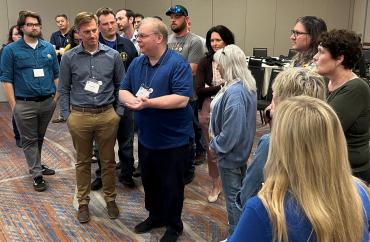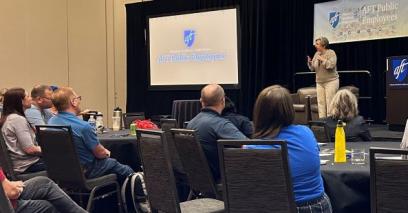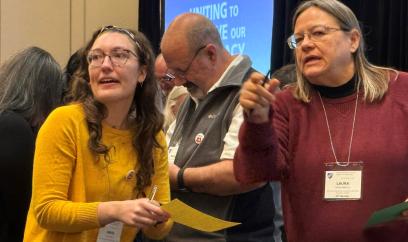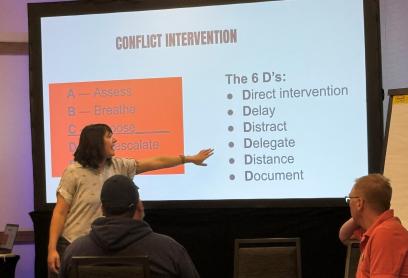Mobilization for nonviolent direct action took center stage at the AFT Public Employees Professional Issues Conference May 29-31 in Denver, with members learning tips and tactics for peaceful assembly.
Before the conference, members received hands-on training in mobilizing to protect democracy and in providing basic first aid at protests and marches. They continued with conference sessions on organizing and leadership, highlighted by how to get through the next few years.
As illustrated by the massive immigration protests in Los Angeles in recent days, AFT pro-democracy activists need to start thinking about how to participate in protests and send teams into nonviolent direct actions. The goal is to keep your community and your union members safe while making sure our voices are heard.
Federal dollars in doubt
Before and during the conference, public employees discussed the ramifications of deep federal funding cuts like the ones Republicans are planning.
Jill Cohenour, a water scientist, a Montana state legislator and a member of the AFT Public Employees program and policy council, pointed out the difference between “donor” and “accepter” states.
Montana, she said, is an “accepter” state: Its taxpayers get back more than $1.80 for every dollar they send to the federal government. And with 40 percent of the state budget coming from federal money, any slashes in federal funding to the states will mean big trouble for Montana.
“I’m telling our legislators to prepare because people are putting their heads in the sand,” she said. “It’s setting us up for failure.”
Privatization persists
Usually, the public employee traveling the farthest to attend any AFT Public Employees event is from the Alaska Public Employees Association—but this year the distance winner was Timothy Fedenko from the U.S. territory of Guam. Fedenko is president of the Guam Federation of Teachers, which represents public employees on the island.
Despite being thousands of miles away, Guam faces the same issues as those on the mainland, including the privatizing of public sector workers like custodians and cafeteria workers. And because of federal funding freezes, Fedenko said, one new public building on Guam was only half built when the Trump administration halted its funding.
Pensions at risk
Discussion of pensions cropped up throughout the conference. In spite of repeated warnings from our local union leaders, pensions have been chiseled away over recent years through the use of pay tiers, in which Tier I is a normal pension and, by the time you get to Tier 3 or Tier 4—or even Tier 6 in New York—it’s “garbage level,” according to one leader.
In Alaska, the public employee pension system was eliminated in 2005, leaving public workers with only a 401(k) plan. Labor has been fighting to restore the pension ever since. This year, a new pension bill has made it out of the Alaska House. Other states are squeezing employees by raising the retirement age to 67 or making other changes to their core retirement programs.
The result? Fewer new employees entering public service.
‘Hope and optimism’
AFT President Randi Weingarten talked about taking the fight forward, chiefly regarding what President Donald Trump calls his “big, beautiful bill.”
“I could probably spend hours talking about the big, ugly bill,” Weingarten said, but the Medicaid and food assistance provisions alone, if they remain as they are in the House bill, would blow a hole in state budgets of up to 30 percent. This bill basically would take a trillion dollars of spending out of the federal government, Weingarten said, and if states want to [sustain services], they’ll have to find a trillion dollars.”
She asked the public employees to think of the kid who gets a wheelchair because of Medicaid, and think about what happens in your state next year if there’s a fight over a trillion dollars. She also addressed the Trump voters in the room, saying she was not blaming them for this result and that she was sure they had thought that with a vote for Trump, they’d be able to pay for more things. Let’s figure out how to move forward, she said.
Weingarten then turned to an idea she’d introduced days earlier: a working class tax cut. If Congress is going to raise the debt to $6 trillion, she said, let’s fight in the Senate for a working-class tax cut, just as we fight for safe hospital staffing. “That’s what gives me hope and optimism,” she said. “What we’re fighting for, not against.”
The AFT president then introduced Lee Saunders, president of the American Federation of State, County and Municipal Employees, which was meeting next door. “There’s no one you want in a foxhole with you more than Lee Saunders. AFT and AFSCME: When we are together, we kick ass,” Weingarten said.
Resist cynicism
Americans are scared, she said. Our opponents don’t want us to engage, so they circulate every type of defeatism, saying: “Oh, there’s no difference between politicians.” Cynicism and apathy are their tools.
That’s why we do mass mobilization training. If people see us out in the streets, the solidarity, that they’re not alone, then there’s a break-the-glass moment, Weingarten said, adding that we’re either going to save democracy or backslide. She exhorted members to join a peaceful protest or town hall.
“I’m sorry that it’s come down to us, but it has. It always comes down to the labor movement,” she added. “When unions get together, almost nothing can beat us. When we do it together, we will win.”
The best organizer
AFT Secretary-Treasurer Fedrick Ingram also thanked public employees for taking on the Trump administration, calling it “a wild ride.” He then turned to Trump’s attacks on healthcare, international trade and the economy.
“In a democracy, you want people to establish themselves with good moral clarity. Want them to be able to work. Public employees keep the center of democracy together,” he said. “When an administration comes in and doesn’t care about these folks, says your job doesn’t matter, after you’ve given your life to public service … it is oppressive.” Trump henchman Elon Musk cast off thousands of federal employees, Ingram said. “Authoritarians break things, they challenge the courts, they fire people, they break people. They divide and conquer. They isolate.”
In this environment, he said, it’s important to understand that there are three types of politicians: “Those who help you in desperate times, those who leave you in desperate times, and those who put you in desperate times.”
Everybody at some point lives in desperate times, he said, whether it’s a health scare or a family loss. “Now we have someone who is putting public employees in desperate times.
“I came by to encourage you all,” Ingram said. “A bad boss is the best organizer. Trump is a bad boss: Your activity, your leadership, your networking. [The union] is a vehicle for you to help yourself.”
Lifting people up
At one plenary session, Diane Byrne, president of Colorado WINS, introduced David Young, the Colorado state treasurer and a former junior high school teacher, “so he knows when people are messing with him.”
Young said he’s inspired by his sister who lives in disability housing, and said he relishes defending the rights of state workers who deliver care for his sister and people like her.
We’re in a difficult time, he said. But he’s optimistic. One reason is that he helped launch the Colorado SecureSavings program.
Even though it’s a common feeling that “I don’t have a pension, so you shouldn’t, either,” that’s the wrong attitude. “That’s dragging people down,” he said. “We should never be in the business of dragging people down; we should be in the business of lifting them up. … We need to have more pensions.” In fact, the state has seen a 40 percent uptick in private sector plans since SecureSavings was instituted.
If Americans don’t do something about the retirement savings crisis, Young said, the cost of driving people into poverty will be an $18 billion problem just in Colorado—trillions nationwide—and that problem will fall on Medicaid.
“This is not a conservative or a liberal issue,” he said. “This is how we’re going to solve our country’s problems.”
Building power
At another plenary session, public employee leaders led a panel discussion on mobilizing and building power. The panelists were Matt Emigholz of the Illinois Federation of Public Employees; Randi DiAntonio of the New York State Public Employees Federation; Hilary Glasgow of Colorado WINS; and moderator Gary Feist, vice president of public employees for North Dakota United.
One topic was workplace violence and bullying, “as if our jobs aren’t hard enough.” After New York state managers forgot their responsibilities, DiAntonio said PEF supported three workers stabbed on the job by an offender with a history of violence. PEF brought in other unions and warned employers that it was coming for them if they didn’t help.
Members now know that they can call 911, that PEF will back them up, and that they have dedicated health and safety staff.
Under threat of federal funding cuts, Glasgow said, we each have to step up, watch who else steps up and move them up the union leadership ladder. Funding crises have brought out leadership qualities, as well as deep strategies for how to meet the moment.
Tools you can use
To help fend off threats to vital federal programs like Social Security, visit AFTvotes.org and pick the issues you are working on from the tab at the top, including Medicaid, public employees, safe hospital staffing and rural communities. AFT Votes also hosts virtual phone banks where union members can call their representatives in Congress. Calls to Congress are particularly impactful right now. If the congressional switchboard is flooded, union members should call their elected officials’ district offices or go visit them in person. Even “friendly” legislators have to get the message that Zoom town halls are not enough.
If you’re starting from the AFT Public Employees landing page, scroll down on the right to the blue AFT Votes box. And don’t leave the AFT website before visiting our Medicaid action page.
Along with the grassroots political protest organization 50501 and other groups, the AFT is part of No Kings Day on June 14, and is offering a No Kings toolkit on our website. Each successive mobilization, starting with the Hands Off protests in March, are not so much about individual rights as they are about the survival of democracy. We all need to come together for this fight.
[Annette Licitra]




